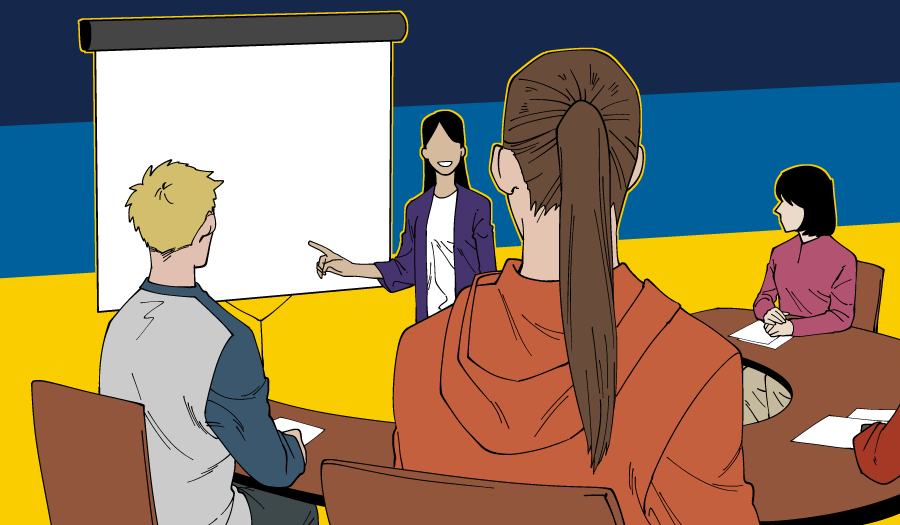This edition of the UC San Diego A.S. Council Meeting news update will only include the Week 4 meeting. The Week 5 AS meeting was cancelled in observance of the U.S. Elections week.
A.S. Council’s Week 4 meeting on Wednesday, Oct. 28 included multiple special meetings regarding Student Promoted Access Center for Education and increasing the budget of the Student Sustainability Collective. The meeting was then followed by the appointments of various advocates for multiple campus offices.
After the roll call, SPACES began its presentation with an explanation of who they are and what work they do for students on campus. The service is built upon a variety of programs and organizations including multiple cultural groups, like the Black Student Union or the Movimiento Estudiantil Chicanola de Aztlán. Their primary goals are to promote access to higher education and increase UC San Diego student retention.
The SSC Directors followed with their presentation by first explaining that they were an advocacy group that promotes social and environmental rights with seven on-going campaigns at UCSD. The directors asked A.S. Council to increase their stipends to $250 per week, citing that their current $120 per week is comparatively lower than other offices on campus like SPACES’s $162 per hour, the Women’s Center’s $135 per hour, or the Cross Cultural Center $210 per hour.
“Directors may be able to work just one job and less hours after other jobs,” SSC Co-Director of Internal Development Sophia Jara said in the presentation. “In turn, this will support their livelihood working while being a student at UCSD. But not only that, this will help them dedicate more time to SSC projects. We can expect more quality and valuable content [with the increased stipend].”
Many associated vice presidents and senators took issue with the SSC’s demands citing that AVPs themselves have dramatically lower stipends and that stipends as a whole are not a replacement for salaries. They state that stipends are made to break down barriers to allow disadvantaged students to join A.S. Council and other student groups on campus without too much of a financial burden.
“Frankly this is absurd and I wonder if you even know how much we get paid,” AVP of Transportation & Transformation Manu Agni said to the council. “We get paid $100 per week and we put in 20-25 hours of work per week. I don’t think stipends were ever designed to be a salary. More than a doubling of your personal stipend is not something AS should be agreeable to… I think asking for more student fees to line your pockets is a little bit offensive to myself as an AVP but I think other AVPs share a similar perspective.”
After multiple debates and an attempt to table the discussion regarding SSC budget increases, the Senate went into a roll call vote and approved the SSC budget increase with a vote of 20 yes, zero nos, and three abstensions. The proposed stipend change will now go to Human Resources for evaluation. If HR decides it will not be possible or that there are some other issues, A.S. Council will have the authority to retroactively amend the SSC stipend request.
The legislative committee also approved new advocates to fill a few roles in the A.S. Office of Health & Well-Being as well as the Office of Local Affairs. Bills L2-L8 and L11 were approved. The advocates within the former office will now assume responsibilities to promote a wide variety of health issues on campus including mental and sexual health. Bill L11, however, will be a part of the latter office to deal with local affairs.
L10 on compensation, within Standing Rule Title V, was amended and approved. However, Bill L9 regarding Standing Rule Title III, which lists the rules and procedures for the Senate, has been tabled indefinitely. The second half of the meeting encompassed a long debate about budgetary matters for the next fiscal year.
A.S. Council meetings take place every week and are open to the public. Students can be a part of these meetings by joining with the Zoom link posted on the A.S. website.
Artwork courtesy of Yui Kita for The UCSD Guardian.















Emma • Nov 16, 2020 at 4:44 am
It is clear how this works in mountaineering https://www.massnews.com/nicolas-krafft-former-loreal-executive-mountain-climbing-success/ : we choose the object, tactics, choose how to go and with whom. On the mountain, the selection error can be very critical. In a situation involving survival and severe physical limitations, the whole essence of a person and what they believe in is revealed. Therefore, in a difficult campaign, your team, your backbone should be well-coordinated, everyone should know what can and cannot be expected from a friend. In mountaineering, such a strong team is formed naturally: first you train together, then you overcome simple peaks and after a while you already know what to expect from a person. In business, I recommend checking people on small things before taking the risk of doing big projects with them.